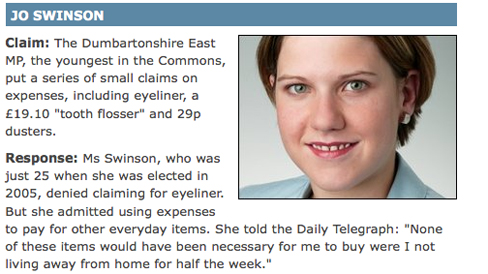Andy Dickinson from the Department of Journalism at UCLAN sums up today’s announcement in this tweet: ‘Telegraph to drip-publish MP expenses online’.
[Update #1: Editor of Telegraph.co.uk, Marcus Warren, responded like this: ‘Drip-publish? The whole cabinet at once….that’s a minor flood, I think’]
Yes, let the data war commence. The Guardian yesterday released its ‘major crowdsourcing tool’ as reported by Journalism.co.uk at this link. As described by one of its developers, Simon Willison, on his own blog, the Guardian is ‘crowdsourcing the analysis of the 700,000+ scanned [official] MP expenses documents’. It’s the Guardian’s ‘first live Django-powered application’. It’s also the first time the news site has hosted something on Amazon EC2, he says. Within 90 minutes of launch, 1700 users had ‘audited’ its data, reported the editor of Guardian.co.uk, Janine Gibson.
The Telegraph was keeping mum, save a few teasing tweets from Telegraph.co.uk editor Marcus Warren. A version of its ‘uncensored’ data was coming, but they would not say what and how much.
Now we know a bit more. As well as printing its data in a print supplement with Saturday’s newspaper they will gradually release the information online. As yet, copies of claim forms have been published using Issuu software, underneath each cabinet member’s name. See David Miliband’s 2005-6 expenses here, for example. From the Telegraph’s announcement:
- “Complete records of expense claims made by every Cabinet minister have been published by The Telegraph for the first time.”
- “In the coming weeks the expense claims of every MP, searchable by name and constituency, will be published on this website.”
- “There will be weekly releases region by region and a full schedule will be published on Tuesday.”
- “Tomorrow [Saturday], the Daily Telegraph will publish a comprehensive 68-page supplement setting out a summary of the claims of every sitting MP.”
Details of what’s included but not included in the official data at this link. “Sensitive information, such as precise home addresses, phone numbers and bank account details, has been removed from the files by the Telegraph’s expenses investigation team,” the Telegraph reports.
So who is winning in the data wars? Here’s what Paul Bradshaw had to say earlier this morning:
“We may see more stories, we may see interesting mashups, and this will give The Guardian an edge over the newspaper that bought the unredacted data – The Telegraph. When – or if – they release their data online, you can only hope the two sets of data will be easy to merge.”
Update #2: Finally, Martin Belam’s post on open and closed journalism (published Thursday 18th) ended like this:
“I think the Telegraph’s bunkered attitude to their scoop, and their insistence that they alone determined what was ‘in the public interest’ from the documents is a marked contrast to the approach taken by The Guardian. The Telegraph are physically publishing a selection of their data on Saturday, but there is, as yet, no sign of it being made online in machine readable format.
“Both are news organisations passionately committed to what they do, and both have a strategy that they believe will deliver their digital future. As I say, I have a massive admiration for the scoop that The Telegraph pulled off, and I’m a strong believer in media plurality. As we endlessly debate ‘the future of news™’ I think both approaches have a role to play in our media landscape. I don’t expect this to be the last time we end up debating the pros and cons of the ‘closed’ and ‘open’ approaches to data driven journalism.”
It has provoked an interesting comment from Ian Douglas, the Telegraph’s head of digital production.
“I think you’re missing the fundamental difference in source material. No publisher would have released the completely unredacted scans for crowdsourced investigation, there was far too much on there that could never be considered as being in the public interest and could be damaging to private individuals (contact details of people who work for the MPs, for example, or suppliers). The Guardian, good as their project is, is working solely with government-approved information.”
“Perhaps you’ll change your mind when you see the cabinet expenses in full on the Telegraph website today [Friday], and other resources to come.”
Related Journalism.co.uk links:
- ‘Has the Telegraph failed by keeping expenses process and data to itself?’ [15/06/09]
- ‘Telegraph ‘didn’t tell any lies but was selective in its facts’, says Lib Dem Voice site editor’ [11/06/09]
- ‘Telegraph to publish ‘unredacted’ information… in print‘ [18/06/09]
- ‘Guardian launches ‘major crowd-sourcing experiment’ with MPs’ expenses application’ [18/06/09]






